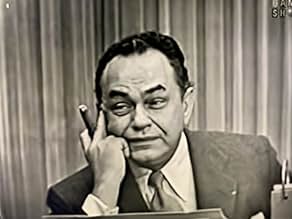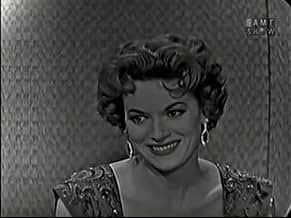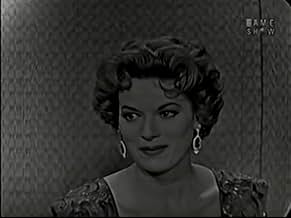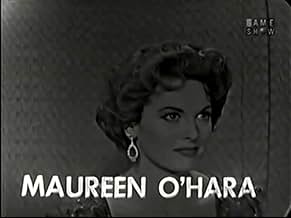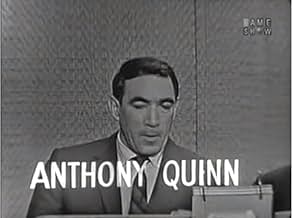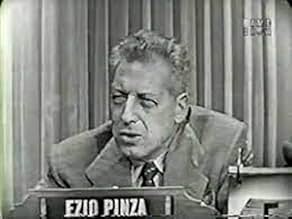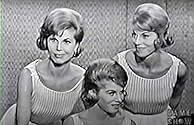What's My Line?
- Fernsehserie
- 1950–1967
- 30 Min.
IMDb-BEWERTUNG
8,5/10
1858
IHRE BEWERTUNG
Vier Diskussionsteilnehmer müssen die Berufe der Gäste - und bei berühmten Gästen mit verbundenen Augen ihre Identität - bestimmen, indem sie nur "Ja"- oder "Nein"-Fragen stellen.Vier Diskussionsteilnehmer müssen die Berufe der Gäste - und bei berühmten Gästen mit verbundenen Augen ihre Identität - bestimmen, indem sie nur "Ja"- oder "Nein"-Fragen stellen.Vier Diskussionsteilnehmer müssen die Berufe der Gäste - und bei berühmten Gästen mit verbundenen Augen ihre Identität - bestimmen, indem sie nur "Ja"- oder "Nein"-Fragen stellen.
- 3 Primetime Emmys gewonnen
- 5 Gewinne & 2 Nominierungen insgesamt
Folgen durchsuchen
Empfohlene Bewertungen
I have recently begun watching this show late at night on the Game Show network and I was surprised at how straight it was compared to the more comedic syndicated version hosted by Larry Blyden. John Daly pretty much treated this show as if it were Face the Nation or Meet the Press or other shows of that ilk. However, the big intangible that made this show as great as it was, was the chemistry between the panelists, especially between Arlene Francis, Bennett Cerf and Dorothy Kilgallen. Sure the Allens, Steve and Fred, were also on the panel, but everyone remembers the "big three" of Arlene, Bennett and Dolly Mae. Also, special kudos must go to Phyllis Newman and Aileen "Suzy Knickerbocker" Mehle. Phyllis and Suzy did admirably filling in for Dorothy in the days after her tragic death. Also, Tony Randall and Martin Gabel were great in their roles as the two of them were pretty much permanent guest panelists on the show. This show will always be a perfect example of style, sophistication and downright fun.
"What's My Line" is one of my favorite programs. The host, John Daly, was an excellent host. He was erudite, respectful, and professional, unlike succeeding game show hosts, who, for the most part, try to be comedians. The panel was also insightful, witty, and humorous without being crude and trying to be funny. They were truly classy people. Even more important to me is to see the civility that existed on that program compared to current programming. It certainly was a different time in terms of respect, manners, and sophistication. As an earlier reviewer, game show formats now appeal to the lowest denominator. Noteworthy is the conduct of the audience. No loud cheering, yelling, and other obnoxious behavior on " What's My line".
How I miss the golden age of television...It was certainly heads and shoulders above most of today's programs which try to pass for entertainment. As we have progressed in so many areas in the past forty years. we have certainly declined in the quality, civility, and humaneness of that earlier era.
How I miss the golden age of television...It was certainly heads and shoulders above most of today's programs which try to pass for entertainment. As we have progressed in so many areas in the past forty years. we have certainly declined in the quality, civility, and humaneness of that earlier era.
Suffering an obsession with the JFK Assassination, I discovered a Ms. Dorothy Kilgallon entangled in the mess. After researching this incredible woman, I started watching 'What's My Line'; having always disagreed with gameshows, I maintained a wearying distance for, ahhhhh 5 seconds :D Within the first few moments I was hooked; the original panelists and Jon Daly exhibit erudition, reason, and humour. Fully exemplary of the class, intelligence, communication, and confidence that America has lacked for entirely too long, I feel as if 'What's My Line?' should be required watching in school, lol! So! My third episode is tonight. I CAN'T WAIT!
I agree with all previous comments about "What's My Line?" (urbane, witty, erudite, sophisticated and intelligent), and I would add this thought: All these appellations are true because this show respected its audience. It did not pander. The panelists were never afraid to use a multisyllabic word. No doubt, some "creative consultant" would stop such behavior today.
Additionally, the show is a time capsule of New York in the '50s. You always knew who was "in town," and often why. Sure, maybe the appearance promoted a Broadway show or a book, but it always seemed more "newsy" than "promotional," unlike today when a talk show host holds up the book or shows an outtake from a movie.
A trivia note: Actress Jayne Meadows appeared as the Mystery Guest on 1 August 1954, the day after her marriage to Steve Allen,who was regular panelist that night. She disguised her voice (as the Mystery Guest often did), prompting Allen to comment that he thought the Mystery Guest might be Minnie Mouse. Panelist Arlene Francis correctly identified Meadows.
Additionally, the show is a time capsule of New York in the '50s. You always knew who was "in town," and often why. Sure, maybe the appearance promoted a Broadway show or a book, but it always seemed more "newsy" than "promotional," unlike today when a talk show host holds up the book or shows an outtake from a movie.
A trivia note: Actress Jayne Meadows appeared as the Mystery Guest on 1 August 1954, the day after her marriage to Steve Allen,who was regular panelist that night. She disguised her voice (as the Mystery Guest often did), prompting Allen to comment that he thought the Mystery Guest might be Minnie Mouse. Panelist Arlene Francis correctly identified Meadows.
I happened to be up late one night and was channel surfing and came across the old "What's My Line" show. I watched it and set up my VCR to tape every night. After a week or so I found myself having a funny sort of feeling when ever I watched. It took a few weeks before I realized what the feeling was. I heard John Daly say that he would see us all next week on Sunday night at 10:30, a bell rang in my head and I remembered that when I was 6 to 12 years old we would spend every Sunday at my grandfather and grandmothers house. When we would get home that night my Dad would turn on the TV and if What's My Line was on I knew it was late and I would have a hard time getting up for school in the morning. I am retired now and the feeling still hits me when I watch this show. My favorite part is the mystery guest, the panel hardly ever misses. I like to look at IMDb and see who the guest's are and read their profiles.
Wusstest du schon
- WissenswertesDorothy Kilgallen was the mystery guest on the February 5, 1961 telecast. She had been hospitalized and missed the previous two broadcasts. Newspaper reports of the time revealed nothing about her condition, nor was it discussed on-air. In 1976 her personal chauffeur, Roosevelt Zanders, revealed that he had driven Kilgallen from New York to Washington during a blizzard so she could report on the JFK inaugural festivities for her newspaper. Immediately after the new president was sworn in (January 20, 1961), Zanders drove Kilgallen directly to a New York hospital. Asked by a biographer (in 1976) if his client's condition was alcohol-related, Zanders replied, "I don't say 'drunk.' One of the things that brought it about was having one or two drinks and not eating. Her system ran down that way." On February 5, 1961, with Bennett Cerf on vacation, Arlene Francis went on live TV assuming Kilgallen was still in the hospital only to discover that she was the mystery guest. During an earlier absence from the show in 1958, Kilgallen had reportedly suffered (according to a newspaper wire service) from "exhaustion and anemia." When she missed several shows in 1965, John Daly said on-air that she had injured herself tripping on a rug. She returned to the show with her arm in a sling and then appeared on every telecast for six months, including a live appearance on the night of her death.
- Zitate
Steve Allen: Is it bigger than a bread box?
- Crazy CreditsThe uncredited announcer introduced the first panelist, sometimes the left-most, sometimes the right-most. Beginning with the first panelist, each panelist then introduced the person to his/her left or right, depending upon the first panelist's position. The fourth panelist then introduced moderator John Daly.
- VerbindungenFeatured in Television Land (1971)
- SoundtracksMelody In Moccasins
(Open Theme 1)
Composed by Wilfred Burns
Original Publisher: Charles Broude, Ltd. (ASCAP)
Original U.S. Publisher: Emil Ascher, Inc. (ASCAP)
Top-Auswahl
Melde dich zum Bewerten an und greife auf die Watchlist für personalisierte Empfehlungen zu.
- How many seasons does What's My Line? have?Powered by Alexa
Details
- Erscheinungsdatum
- Herkunftsland
- Sprache
- Auch bekannt als
- Occupation Unknown
- Drehorte
- Produktionsfirmen
- Weitere beteiligte Unternehmen bei IMDbPro anzeigen
- Laufzeit30 Minuten
- Sound-Mix
- Seitenverhältnis
- 1.33 : 1
Zu dieser Seite beitragen
Bearbeitung vorschlagen oder fehlenden Inhalt hinzufügen

Oberste Lücke
By what name was What's My Line? (1950) officially released in India in English?
Antwort
